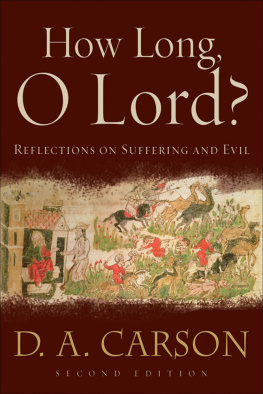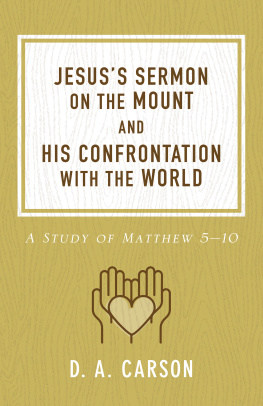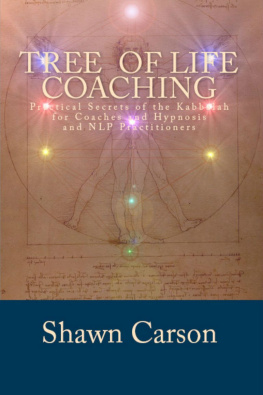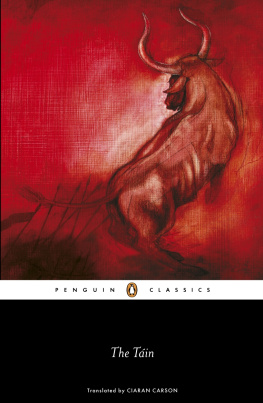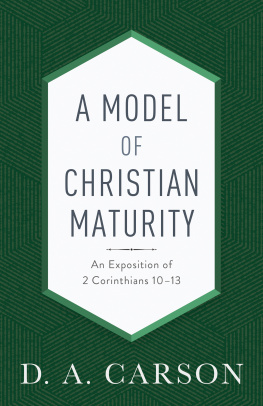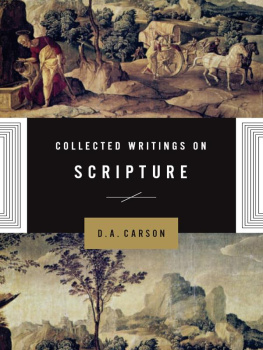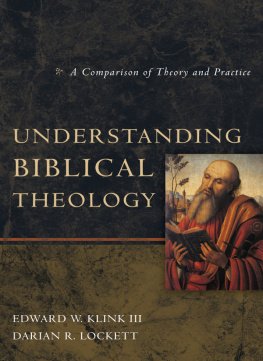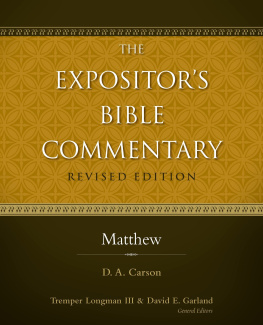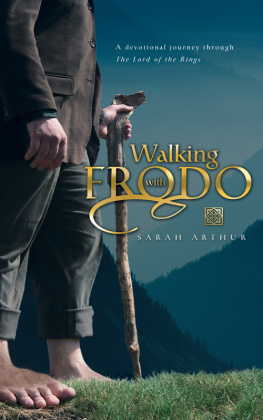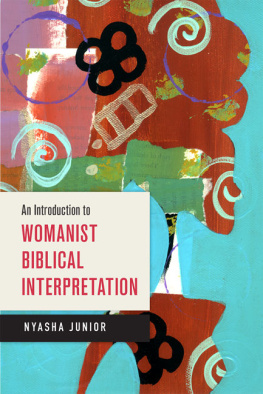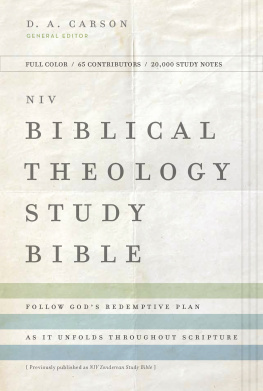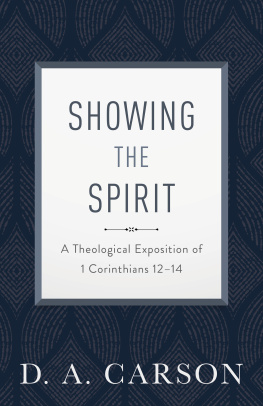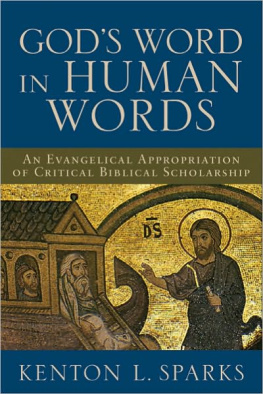
How Long, O Lord?
Reflections on Suffering and Evil
Second Edition
D. A. Carson

1990, 2006 by D. A. Carson
Published by Baker Academic
a division of Baker Publishing Group
P.O. Box 6287, Grand Rapids, MI 49516-6287
www.bakeracademic.com
Ebook edition created 2012
All rights reserved. No part of this publication may be reproduced, stored in a retrieval system, or transmitted in any form or by any meansfor example, electronic, photocopy, recordingwithout the prior written permission of the publisher. The only exception is brief quotations in printed reviews.
ISBN 978-1-4412-0078-5
Library of Congress Cataloging-in-Publication Data is on file at the Library of Congress, Washington, DC.
Scripture quotations are from the Holy Bible, Todays New International Version. TNIV. Copyright 2001, 2005 by Biblica, Inc. All rights reserved worldwide. www.zondervan.com
The internet addresses, email addresses, and phone numbers in this book are accurate at the time of publication. They are provided as a resource. Baker Publishing Group does not endorse them or vouch for their content or permanence.
Denzill Raymer and Colin Hemer
in memoriam
My soul is in anguish.
How long, O L ORD , how long?
Psalm 6:3 NIV
Contents
Preface to the Second Edition
None of my other books has elicited as many moving letters from readers as this one. For the unavoidable reality is that if we live long enough, we will sufferand this attempt to think about suffering and evil from within a biblical perspective helped some believers, at least, who were struggling through deep waters. So I am grateful that it is being republished in this revised edition.
The structure of the argument has not changed. Many of the illustrations have been brought up to date, and a number of other improvements have been attempted. Discussion of AIDS, for instance, needs not only updated statistics, but a number of other substantial changes. The NIV has been replaced by the TNIV.
Yet I have tried to preserve the level of discussion of the first edition, along with the balance of Scripture. Indeed, if you want to plunge into the biblical and theological material right away, skip chapter 2: not every reader wants to survey false steps before beginning to think through what the Bible says. Regardless of where you start, my hope and prayer is that this short volume will help a new generation of Christians, and others who may wish to listen in, think through questions all of us must face in this broken, beautiful, and twisted world.
D. A. Carson
Trinity Evangelical Divinity School
Preface to the First Edition
I had better say right away what this book is not about. It is not a quick answer to difficult questions about suffering. Nor is it (except implicitly) a defense of the existence of God. It is not even the sort of book I would give to many people who are suffering inconsolable grief. Still less is it an academic discussion of philosophical problems.
So what is it about? It is, first of all, a book written by a Christian to help other Christians think about suffering and evil. That means, for instance, that I am not primarily addressing unbelievers who think that the problem of evil and pain is so intractable that it calls into question the very existence of God. There are excellent books that treat the subject from that perspective, but this is not one of them. If you are an unbeliever, you are welcome to listen in. Indeed, you may find the world you are entering so compelling that you will want to become a Christian. But you are not the reader I have in mind as I write.
Primarily, this is a book of preventative medicine. One of the major causes of devastating grief and confusion among Christians is that our expectations are false. We do not give the subject of evil and suffering the thought it deserves until we ourselves are confronted with tragedy. If by that point our beliefsnot well thought out but deeply ingrainedare largely out of step with the God who has disclosed himself in the Bible and supremely in Jesus, then the pain from the personal tragedy may be multiplied many times over as we begin to question the very foundations of our faith.
Of course, not all doubts and fears arise from false expectations based on questionable beliefs. At the intellectual level, a Christian may be as orthodox as the apostle Paul, yet so lack the apostles spiritual maturity that when the first crisis hits all the orthodox commitments are again thrown into the melting pot. Nevertheless, it is hard to think of Christians agonizing over basic questions if their suffering has not, to say the least, been exacerbated by false expectations as to what God is like, what God does, what place suffering has in this world. For instance, pain may pose the question, Why me? That soon gives way to Why are you punishing me? or Why are you picking on me? And that is only a whisper from far bleaker thoughts, articulated or not: Maybe you arent a God of love. Maybe you are capricious. Maybe you arent fair, let alone holy. Maybe you arent there. C. S. Lewis could describe his conversion by the memorable title Surprised by Joy ; most of us Christians ruefully admit that there are times when our faith is surprised by grief.
This book, then, is designed to help. It does not offer a comprehensive guide to the problem of suffering; it develops only a few themes, somewhat arbitrarily chosen according to what has been of help to me and to some of those to whom I minister. Quite frankly, this little book, as I have already hinted, may not be of assistance to those whose despair is so bleak that they cannot bring themselves to read, think, and pray. But I shall be satisfied if it helps some Christians establish patterns and habits of thought that are so strong that when the hardest questions batter the soul there is less wavering and more faith, joy, and hope.
Because this is a book for general readers, I have largely avoided bibliographies and technical discussions. By and large, the books and articles I mention are those that I actually cite. Despite my best efforts, chapter 11 is a little difficult. If it is too daunting, skip it; but if you can absorb it, make the effort, for I am persuaded that the biblical truths outlined there have enormous potential for stabilizing the faith of Gods people.
Much of the material in these pages was first developed for talks in America, Australia, the United Kingdom, and Kenya. I am grateful to many people for the questions they put to me, questions that have helped me to be more careful than I would have been, and to try extra hard to produce a book that would heal and nurture, and not merely inform. That I have not always succeeded is embarrassingly clear to me; if I have succeeded at all it is because I owe much to the probing of others, especially those who have suffered far, far more than I and whose lives have set an example for the Lords glory and his peoples good.
Pain and suffering often generate a profound sense of loneliness. We think we are cut off from everyone, we feel that no one can possibly understand. The truth is that it often helps to talk things over with other Christians. For that reason I have included a set of questions at the end of each chapter. Ideally they should be used in a study group. Reflecting on such questions in splendid isolation will not be nearly as therapeutic.
Soli Deo gloria .
D. A. Carson
Trinity Evangelical Divinity School
Next page
